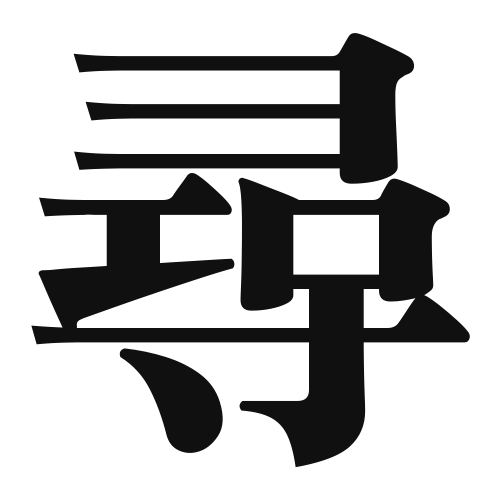1. Overview of Meaning
The kanji “尋” (pronounced “shin” or “tazuneru”) primarily means “to inquire” or “to seek.” It conveys the idea of searching for information or asking questions.
2. Formation and Radical
Formation of the Kanji: The kanji “尋” is a phonetic-ideographic character (形声文字). It combines the meaning of “to seek” with phonetic elements that suggest its pronunciation.
Radical: The radical for “尋” is “言” (gen), which relates to speech or words, indicating its connection to communication and inquiry.
3. Examples of Usage
Common Words and Phrases: Some frequently used words that include “尋” are “尋ねる” (tazuneru – to ask) and “尋常” (jinjou – ordinary, usual).
Example Sentences in Daily Conversation:
- 彼に尋ねてみてください。 (Kare ni tazunete mite kudasai.) – Please try asking him.
- その問題について尋ねる必要があります。 (Sono mondai ni tsuite tazuneru hitsuyou ga arimasu.) – I need to inquire about that issue.
4. Synonyms and Antonyms
Similar Kanji: A similar kanji is “問” (mon), which also means “to ask” or “to question,” but it is more focused on the act of questioning rather than the broader concept of seeking information.
Antonyms: An antonym could be “無” (mu), meaning “nothing” or “absence,” as it represents the lack of inquiry or seeking.
5. Cultural and Historical Background
Relation to Japanese Culture: The concept of inquiry is deeply rooted in Japanese culture, where asking questions is often seen as a sign of respect and a desire to learn.
Proverbs and Idioms: One relevant proverb is “聞くは一時の恥、聞かぬは一生の恥” (Kiku wa ittoki no haji, kikanu wa isshou no haji), which translates to “Asking is a moment’s shame, not asking is a lifetime’s shame,” emphasizing the importance of seeking knowledge through inquiry.
